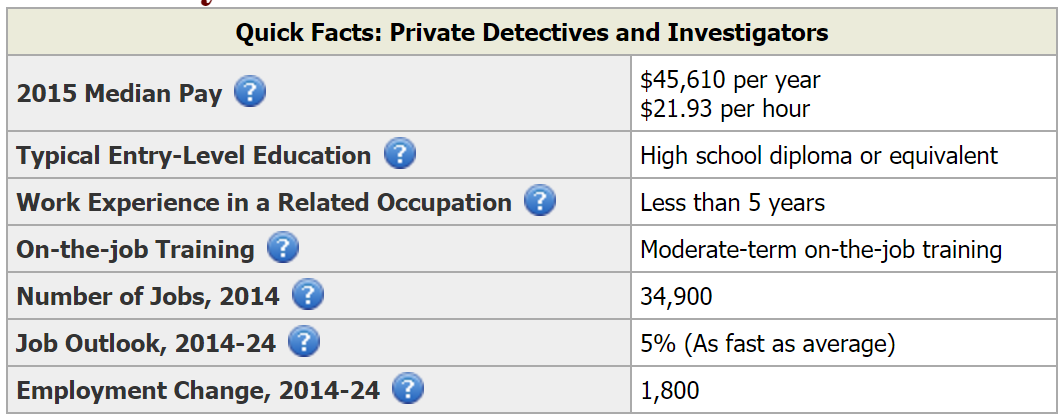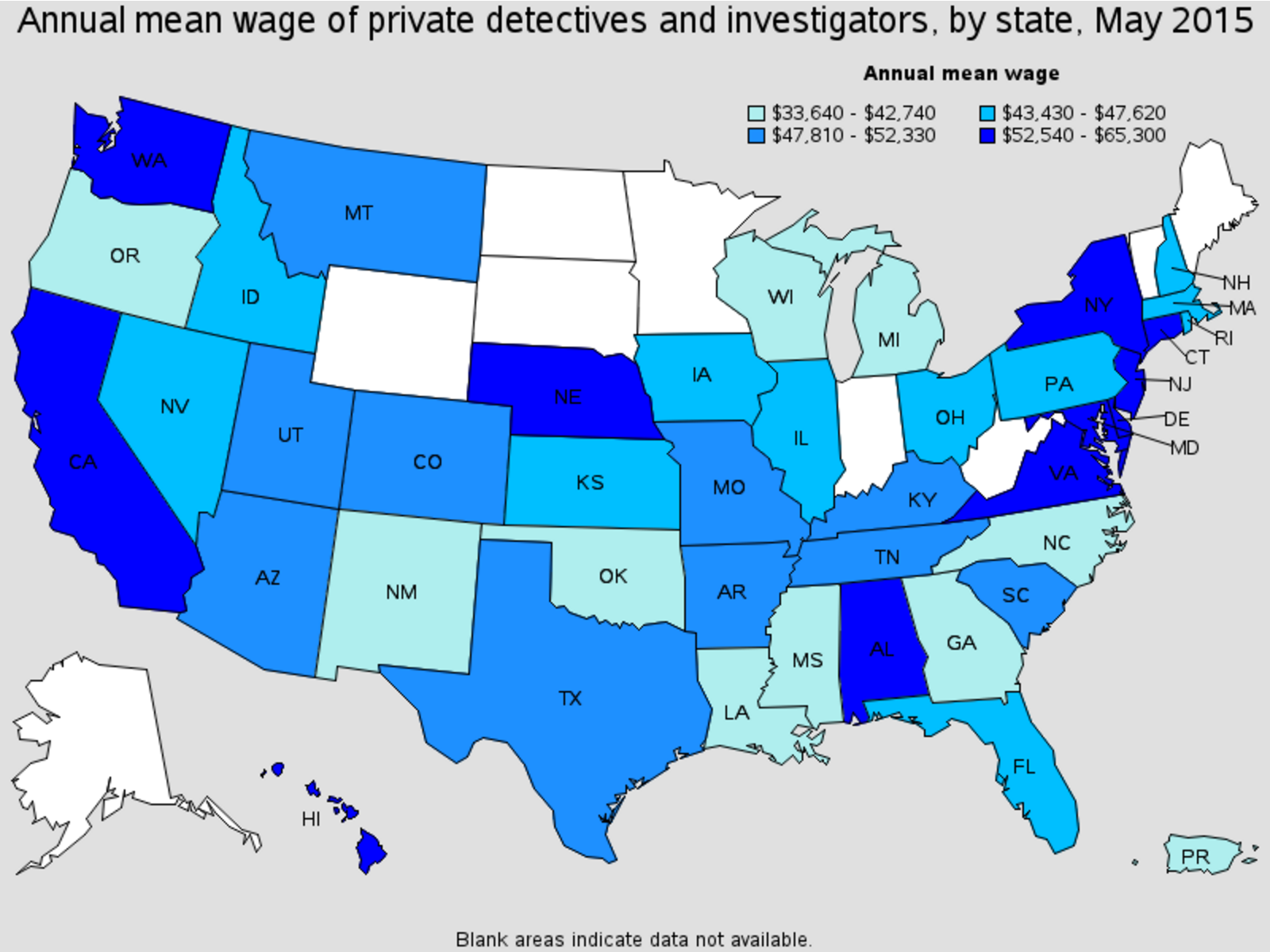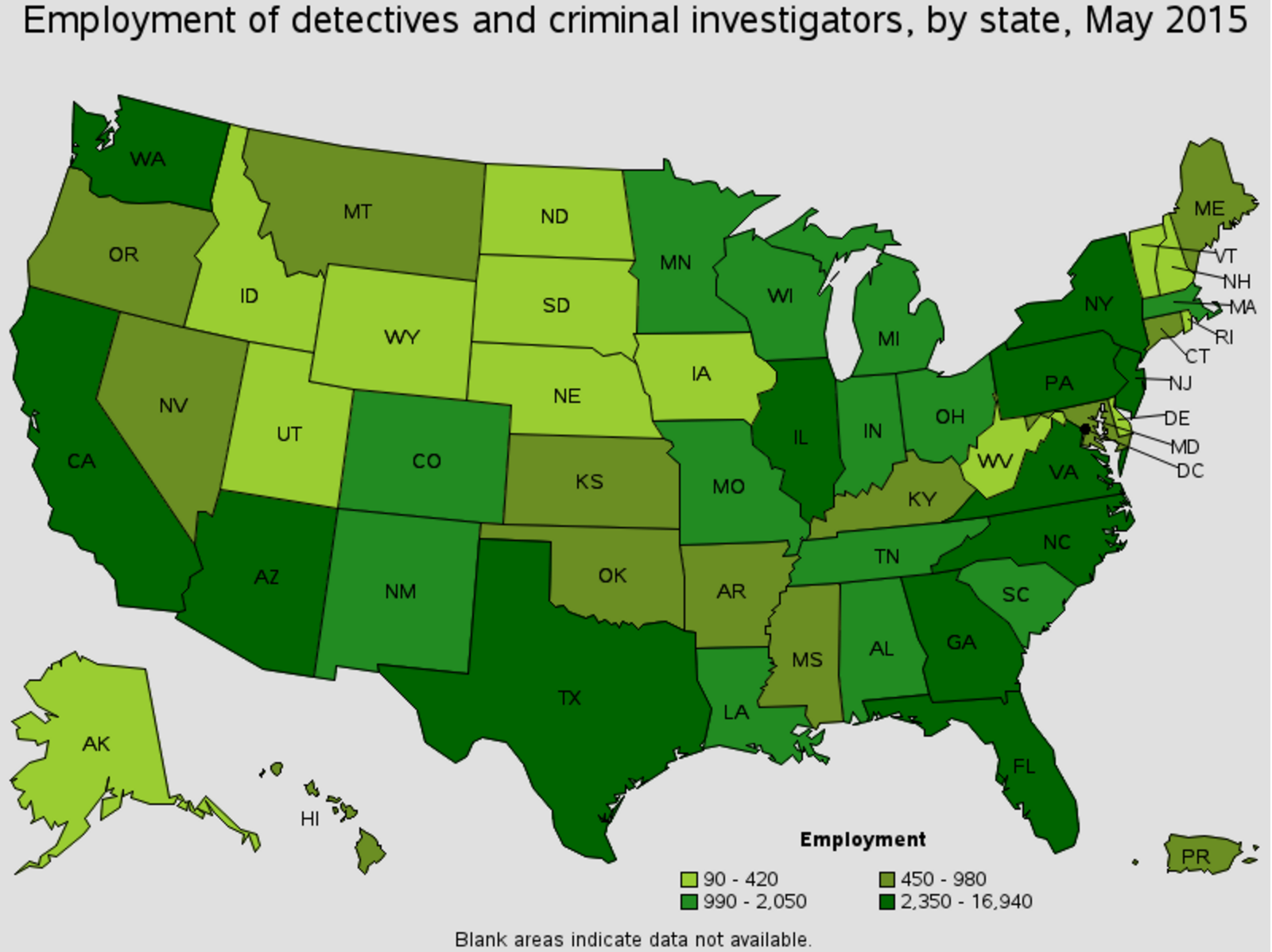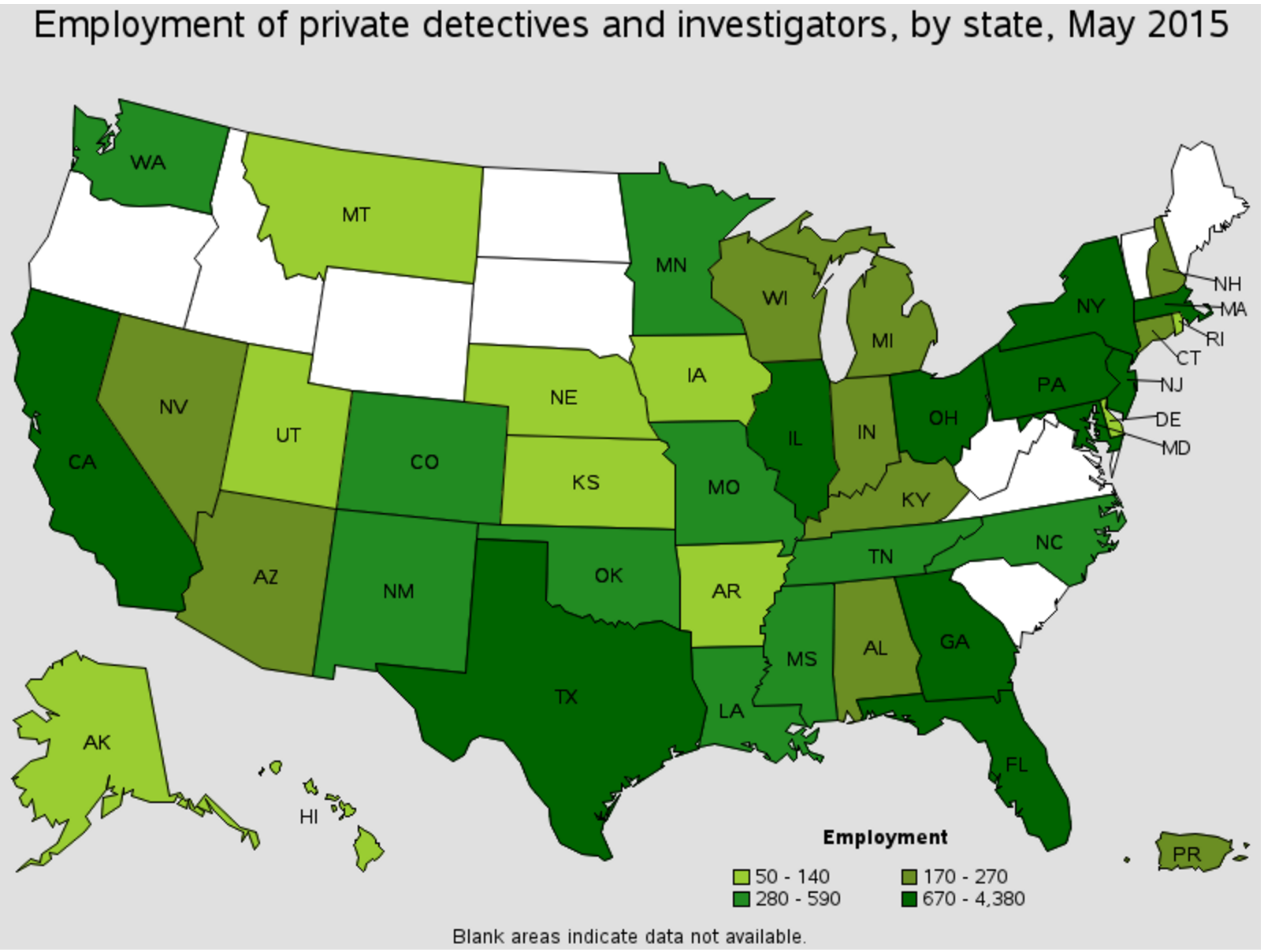Growing up watching detective serials and movies, everyone wants to become a detective. Assuming to be like Sherlock Holmes is normal for us after we have known his character. However, we turn this dream into a reality along the way. In recent years, due to the increased rate of crime, there is a greater need for detectives to solve them. This is where some police officers step up and exhibit the Sherlock Holmes in them. If becoming a detective someday is a burning desire of yours, the information listed below is a great help.


Table Of Contents
- Average Detective Salary
- Detective Career Outlook
- How To Become A Detective
- Detective Job Description
How Much a Detective Earns
The employer is the one who will decide regarding the detective’s salary. In most circumstances, a state employed investigator earns more than a private one. This is mostly due to steady work that they receive compared to the intermittent work of a private detective.The reason behind this is they always have work to do compared to a private detective. The national average for a state-employed detective is $76,000. Whereas the average salary for a private detective can be around $45,000. The factors that affect a PI’s salary will be discussed later. Here are the factors that affect the salary of investigators that are state employed.
[asd_program_button /]Size of population
Just like police officers, the income of a detective is dependent on the city’s population. A more populated city will mean more cases to be handled. Thus, the increase in salary. One of the major factors in deciding the salary of an investigator is the crime rate. For instance, someone in the LA police department will get an average salary of $44,000 to $88,000. Compared to someone in Miami Police department, the average salary ranges from $86,000 to $107,000.

Location of job
Crime rate and population of the place are closely related to the location. However, cost of living is another factor to consider. Higher the cost of living in a certain location, higher the detective is paid. This logic agrees with the case of private investigators too. District of Columbia, Alaska, and New Jersey all pay 6-figure salaries with District of Columbia paying as much as $116,000.
Education background
For any police job (except at the federal level), a high school degree is sufficient. States have different rules but a higher education certificate is not necessary in some states. But, the importance of higher education is considered by some states and departments that is why a degree after high school is a factor that affects the salary of the officers and detectives. This may be an associate’s, bachelor’s or even a master’s degree. Depending on your degree, you might be paid more.
Experience
Your length of stay in the field will be a consideration on how much you will earn as an investigator. An increase of up to $20,000 will be given to those who work in the field for 20 years if they don’t get a promotion. But if you are promoted as a Police Chief, you will be paid about $180,000 per year.
Altamont Private Investigators
A private investigator’s salary depends on the number of cases he or she takes and solves. As mentioned before, the location can affect the price along with the many other factors such as the amount of discretion needed, the amount of danger involved, extra equipment required and many other things. The price for the job will be quoted by the investigator after the problem is presented by the clients.

A state-employed detective has a steady income that will increase by various means as described here. The salary of a private investigator cannot be determined and by being famous it can be increased. The path to choose will be determined based in the financial facts you have.
Altamont Detective Career Outlook
First thing first, we will be talking about career growth in this field. There were about 106,000 public detectives or criminal investigators recorded in 2015. On the other hand, there were only about 30,000 private investigators holding a job at the same time. In this industry, the predicted growth of private detectives is about 15%. This means that there will be about 1,500 new jobs open by 2025. This growth rate is following the average growth rate of 5% across all other sectors. This figure is only 4% for public investigators. Meaning to say, in 2025 it is expected that there will be 4,000 more jobs as a criminal investigator. This can be considered as an average rate of growth as well.
[asd_program_button /]The employment increases steadily because the population increases. As the population increases, more people need to be protected and more criminals need to be caught. But due to the strict implementation of laws and technology are more advanced, the crime rate is not increasing that much. Hence, there is a balance in each other, which leads to average growth in both careers.

The highest number of Criminal/Law Enforcement Investigators are found in Texas, California and New York. Western states and Texas show more employment here than the eastern ones. Private detectives are prominent in California, Texas and Florida with the southern states tending to employ more compared to the northern ones.
Let’s see what are the industries that hire these professionals most. Criminalinvestigaors are being hired mostly by The Local, State government and the Federal branch. Whereas private detectives are being hired by Security Services, Consulting services and the local government for consultation purposes on a few cases.
When it comes to finance, criminal investigators are paid more compared to the private ones. Criminal investigators receive $80,000 as average salary annually while Private investigators earn $52,000 only. Public investigators are paid most in District of Columbia, Alaska, and New Jersey in the aspects of geography and finance. Private detectives were paid most in Alabama, Nebraska, and New Jersey.
Comparing with different industries again, we see that for private industries, the most employing industries do not pay the highest. In fact, Electromedical, Navigational, Power generation, Metal Product forming and other such industries paid the most for private detectives since they had the most sensitive information to protect. Moving on to Public Investigators, federal agencies, postal services, and educational institutes pay the most.

Qualifications to Become a Altamont Detective
It is important to note that there are two kinds of detectives. There are private investigators that the general public can hire to investigate on certain things. The others are employed by the government and reach this post after being promoted from a police officer. We are going to explore here the different avenues.
[asd_program_button /]Finish your High School Studies
A detective is generally a police officer who has been promoted to that position because of his or her skills of deduction. Thus, a general way in becoming a detective is to first complete high school and get into the police academy to become a police officer. A high school degree is likewise necessary if you want to be a private investigator.
Get Yourself a Bachelor’s Degree
In most cases, enlisting in the police force won’t require a bachelor’s degree. Although some officers would like to have other means of employment right after retirement. Likewise, you will need a bachelor degree if you want to become a detective.
Many institutions require applicants to have a bachelor’s degree in law, criminal justice or psychology to become a detective. If you have an associate’s degree, you will need at least 5000 hours. On the other hand, someone with a bachelor’s degree needs only 4000 hours of training.
Get the right amount of experience
Professional experience as an investigator is required in order to become a professional detective. You can find several ways to do so. Getting employed by the government is basically the most common method. Landing work as a law enforcement investigator, arson investigator, or criminal investigator will count as being a person with experience. However, you can also choose to work as a licensed repossessor or office investigator.
There might be variations in the required experience in the state you’re applying in. Some states require you to have 3 years of experience while others require 5 years.
Acquire a license for your guns
Investigators who don’t have a firearms permit are prohibited from carrying their guns. There are several firearms with strict requirements such as completing a full training course before the permits are issued. Therefore if you want to own a firearm while working as an investigator, completing the training course is necessary to get your own permit.
Obtain Illinois licensure
A licensure test is required after you have all the requirements needed. This test usually contains some multiple choice questions about state laws and some procedures that often need to be carried out. The test is only available for those who want to be private detectives. If you managed to pass, you will become a licensed private investigator.
Insure Yourself
Due to the dangerous nature of the work, you should make sure to get an insurance. This is generally medical insurance of about $10,000. However, it is important to also get a higher amount if you carry a firearm since you need to protect yourself from greater dangers and insure the gun itself.
By completing these steps, you’ll be good to go. You can now start living the detective life you always wanted. Keep in mind however that there are dangers associated with this line of work. If that doesn’t scare you away, then you should fulfill all the requirements as soon as possible.
Responsibilities of Being a Detective in Altamont
Crime Scene Investigation
It will be a detective’s duty to carefully assess a crime scene and come up with the most sensible deduction. He will then collect any evidence he can find in the crime scene. They are supposed to take anything into custody that may look suspicious and may be used for clues or in the court later. In some cases, detectives can receive aid from the forensic investigation department, hence allowing them to come up with more deductions regarding the crime. Detectives should gather as many clues and evidences as possible by analyzing cameras and gathering information from eye witnesses.
[asd_program_button /]Criminal Research
One of the core aspects of a detective’s duty is doing research and groundwork regarding previous cases. This is so that they can have an insight regarding criminal patterns and behaviors. In most cases, this will mean researching into previous records for them to know how the culprit might operate. Research is definitely of great help when it comes to tracking down serial killers. It also helps to identify tactics that a drug cartel might be using thus helping the detectives shut them down. Through the help of general research, it will be a lot easier for detectives to identify the culprit or make any accurate deductions.
Narrowing down suspects
The whole objective of everything that a detective does is to serve justice to the person who has committed the crime. But to do this, they first need to a list of possible suspects. In some cases, it could include over a hundred people, but there are also cases where there is none. With the help of evidence, research, statements, and forensic studies, they are able to come up with such list. This suspect pool is then narrowed down by getting alibis from some suspects and interrogating others. With a narrowed down list, they will then have the suspects admit to their crimes.
Testifying In Court
As part of their final job, detectives will need to make sure justice is served. The court will sometimes summon the detective to the court to aid with the process. They either narrate a possible scenario of how the crime was committed, describe how the evidence incriminates the suspect or provide their expert views on certain topics. In some cases, they will even accompany the culprit to the jail.
Altamont Private Detectives
All the above duties were that of a public detective or a law enforcement detective. Keep in mind that the job of a private detective isn’t as easy as it seems. They are supposed to carry out their client’s wishes to the best of their abilities as far as reconnaissance is concerned. But there are limits which they shouldn’t go beyond when carrying out their duties. Private detectives are often hired for tasks such as gathering evidence from someone, monitoring certain individuals, or even tracking finances. They should never act in a way that they can be easily recognized as a detective in public. They are however, not allowed to arrest anyone.
As you can see, the “Idiot Box” was right for the most part. But the jobs that these detectives (private and public) must undergo daily are stressful beyond comparison. They are never displayed on portrayed on the media or anywhere else. Detectives should make sure to find any clue they could get since a lot of people’s lives lie on them. If you think being a detective is the right job for you, then you should do research about it now!
